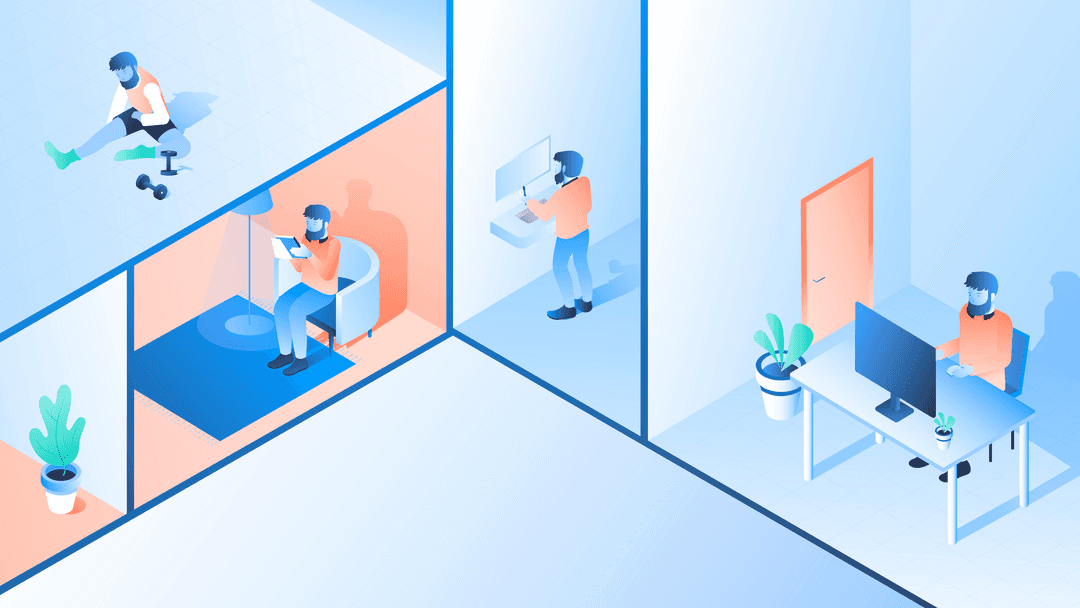Working from home

There’s a lot to love about working from home: no commute, pajama days, and for many of us, improved productivity. Recent research found that switching to remote work made people 7% more productive than their office-based colleagues.1
But switching to a home office can present new challenges to your mental and physical health. Keeping up a healthy routine, working safely, and staying connected with your colleagues can become more difficult when working remotely.
Let’s learn what steps you can take to make sure you stay safe, healthy, and happy while you work from home.
Keep a routine
Heading out to a separate workspace every day creates routine in your life, promoting health and wellbeing.2 When you work from home, you need to make extra effort to keep those routines up. Here are our top tips.
Stick to your regular sleeping pattern
Good sleep habits are essential for your mental and physical health.3 So try to get an early night and make sure you set your alarm for the morning.
Get dressed for work
Research shows that people perform better when they’re wearing clothes with symbolic meaning.4 That means getting dressed for work could help you be more productive. No need for a suit and tie, but try to keep pajama days for special occasions.
Close your laptop at the end of the day
Firm boundaries between your professional and personal life are important to stop you from burning out. So make sure you stop working at the end of the day and make time for yourself.
Work safely
Without office health and safety, it’s up to you to make sure you’re taking good care of yourself at work. Here are our top tips to make sure you’re staying as safe as possible.
Create an ergonomic workspace
It can be tempting to work from a bed or sofa. But spending all those hours curled up can take its toll on your mental and physical health.5 Instead, invest in proper lighting and an ergonomic desk and chair to create a dedicated workspace.
Take regular breaks
It’s easy for hours to slip by when you’re focusing on work without distractions from colleagues. But you must remember to take regular breaks from work to move your body and rest your eyes. Why not try the Pomodoro technique?
- Focus on 1 task for 25 minutes.
- Take a 5-minute break. That’s 1 Pomodoro.
- After 4 Pomodoros, reward yourself with a 30-minute break.
Use your breaks creatively: stretching, walking around the block, or meditating–anything but work.
Make time for exercise
Research shows office workers spend 81.8% of their working hours sedentary.6 Without a commute and the steps you get walking between meeting rooms, it’s more important than ever you make the extra effort to move throughout the day. Aim for 30 minutes of moderate physical activity per day.
Stay connected
Social interactions are a plus of office work. Regular chats and social interactions with your colleagues are necessary for your mental and physical health.7 Here are our top tips for staying connected while working from home.
Overcommunicate
Remote work can leave teams feeling disconnected. But when you’re not together, good communication is more critical than ever. Be sure to reach out to your manager and team regularly. Keep each other updated so you can support one another fully.
Opt for video
Posture, facial expressions, hand gestures, and tone of voice: there’s more to communication than the words you use.8 So whenever possible, opt for a video call with your colleagues.
It’s ok to say no
That said, constant video calls can eventually leave you feeling emotionally and physically drained.9 So if you’ve had enough, don’t hesitate to switch off the camera.
With a few minor changes, it’s easy to take good care of yourself while working from home.
Emma Harrington and Natalia Emanuel. Working Paper. “'Working' Remotely? Selection, Treatment, and Market Provision of Remote Work (JMP)”. Accessed: March 2021.
Heintzelman, S.J. & King L. A. SPSP, (2018), doi: 10.1177/0146167218795133
Watson, N. F., et al. JCSM, (2015), doi: 10.5665/sleep.4716.
Adam, H., & Galinsky A., D. JESP, (2012), doi: 10.1016/j.jesp.2012.02.008
BBC. “What happens when you work from bed for a year” Accessed March 2020.
Parry, S. & Straker L. BMC Public Health, (2013), doi: 10.1186/1471-2458-13-296.
Sirven, N. & Debrand, T. Soc Sci Med, (2008), doi: 10.1016/j.socscimed.2008.09.056.
Park, S. G., and Park, K. H. Korean J Med Educ. (2018), doi: 10.3946/kjme.2018.94.
Harvard Business Review. “How to combat Zoom fatigue” Accessed March 2020.